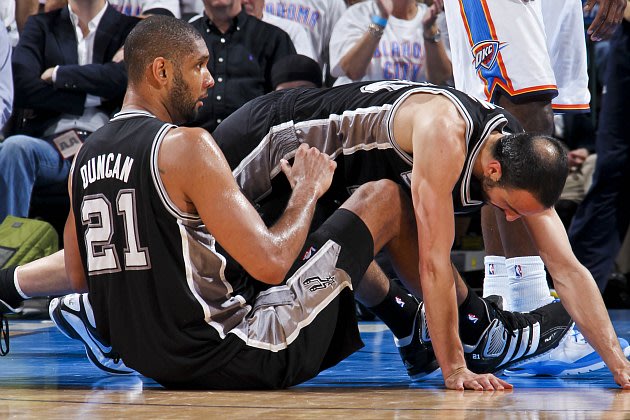 Tim Duncan and Manu Ginobili execute the rare "Whispering Lion" flopping technique (Layne Murdoch/ Getty).
Tim Duncan and Manu Ginobili execute the rare "Whispering Lion" flopping technique (Layne Murdoch/ Getty).To some NBA fans, flopping is a scourge upon the NBA. Like pump-faking or playing with other superstars, it degrades the ideals of competition on which sport is founded. If the NBA wants to be taken seriously and move beyond record ratings, they must do something drastic.
Luckily, David Stern and his handpicked competition committee are meeting this week to discuss potential fixes. On Monday, they talked specifically about how to hand out punishments after games. From Brian Mahoney for the Associated Press:
The NBA commissioner believes too many players are deceiving referees into calling fouls by falling down, or flopping. So he and the league's newly reformed competition committee met Monday for a discussion about how it can be prevented.My own joking aside, it would be good if the league could crack down on flopping. I'm not convinced that it's a major issue for the NBA, but it'd be best if it weren't so prevalent. On the other hand, the postgame plan helps underline exactly why it will be hard to stop flopping.
One option, Stern said, is a ''postgame analysis'' in which a player could be penalized if it was determined he flopped. The league retroactively upgrades or downgrades flagrant fouls after review, and along those lines he said that perhaps a player could receive a message from New York saying: ''Greetings from the league office. You have been assigned flopper status.''
''No, I'm joking, but something like that,'' Stern said. ''That sort of lets people know that it's not enough to say 'it's all part of the game.'''
Under this proposal, one man (perhaps suspension/fine czar Stu Jackson) would have to assess all questionable flopping instances on any night. But if flopping is as common as some believe, then that would be a time-consuming process, particularly on nights with 10 or more games. Can a centralized situation do that much work? Would the league have to enforce selectively to make it manageable? Is that fair?
In this case, the solution to the War on Flopping might prove much more controversial and difficult to rein in than the crime itself. The NBA and its fans have every right to cry foul over flopping, but they'd do well to consider the unintended consequences of enforcement.
No comments:
Post a Comment